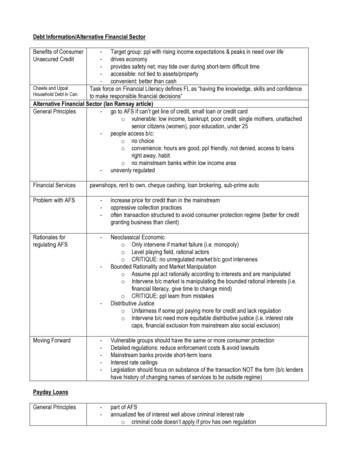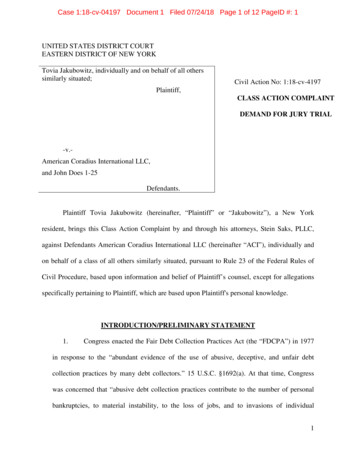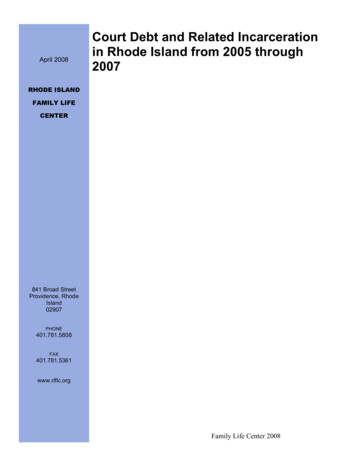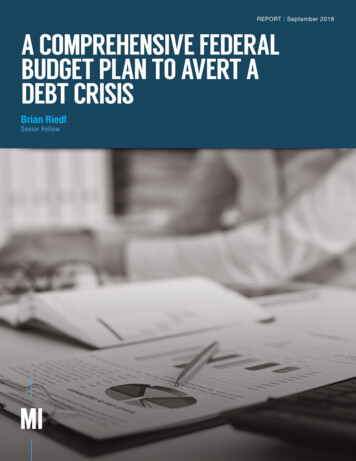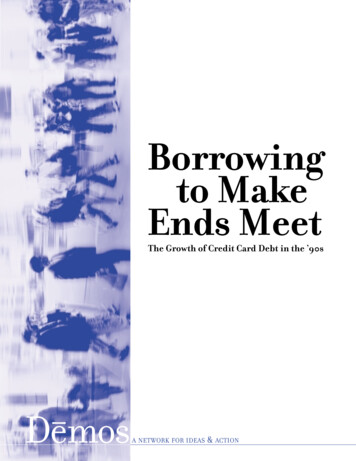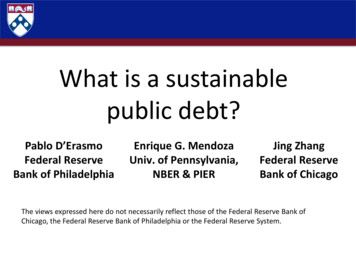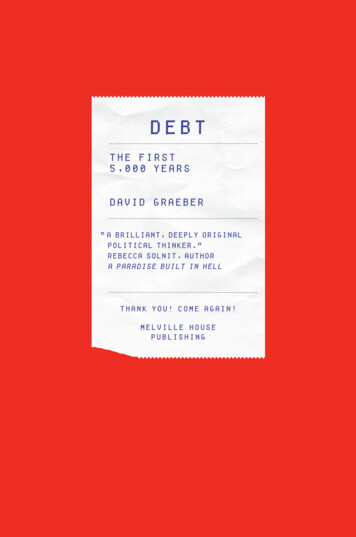
Transcription
DEBT
DEBTTHE FIRST5,000 YEARSDAVID GRAEBER'* MELVILLEHOUSEBROOKLYN, NEW YORK
2011 David GraeberFirst Melville House Printing: May 2011Melville House Publishing145 Plymouth StreetBrooklyn, New York 11201mhpbooks.comISBN: 978-1-933633-86-2Printed in the United States of America1 2 3 4 5 6 7 8 9 10Library of Congress Cataloging-in-Publication DataGraeber, David.Debt : the first 5 ,000 years I David Graeber.p . em.Includes bibliographical references and index.ISBN 978-1-933633-86-2 (al k . paper)1.Debt-History. 2.Money-History. 3. Financial crises-History.I. Title.HG370l.G73 2010332-dc222010044508
CONTENTS1On The Experience ofMoral Confusion212The Myth of Barter3Primordial Debts434Cruelty and Redemption73sA Brief Treatise on the Moral61Grounds of Economic Relations89Games with Sex and Death127Honor and Degradation , or,On the Foundations ofContemporary Civilizations165Credit Versus Bullion,And the Cycles of History211The Axial Age (800 BC-600 AD)22310 The Middle Ages (600 AD-1450 AD)251911Age of the Great CapitalistEmpires (1450-1971)30712 (1971-The Beginning of SomethingYet to Be Determined)361Notes393Bibliography455Index493
Cha pte r O n eO N TH E EXPE R I E N C E O F MO RAL C O N F U S I O Ndebt noun1a sum of money owed.2thestate of owing money. 3 a feeling ofgratitude for a favour or service.-Oxford English DictionaryIf you owe the bank a hundred thou sand dollars, the bank owns you. Ifyou owe the bank a hundred milliondollars, you own the bank.-American ProverbTWO YEARS AGO, by a series of strange coincidences, I found myselfattending a garden party at Westminster Abbey. I was a bit uncom fortable. It's not that other guests weren't pleasant and amicable, andFather Graeme, who had organized the party, was nothing if not a gra cious and charming host. But I felt more than a little out of place. Atone point, Father Graeme intervened, saying that there was someoneby a nearby fountain whom I would certainly want to meet. She turnedout to be a trim, well-appointed young woman who, he explained, wasan attorney-"but more of the activist kind. She works for a founda tion that provides legal support for anti-poverty groups in London.You'll probably have a lot to talk about. "We chatted. She told me about her job. I told her I had beeninvolved for many years with the global justice movement-"anti globalization movement," as it was usually called in the media. Shewas curious: she'd of course read a lot about Seattle, Genoa, the teargas and street battles, but . . . well, had we really accomplished any thing by all of that?"Actually," I said, "I think it's kind of amazing how much we didmanage to accomplish in those first couple of years. "
2DEBT"For example?""Well, for example, we managed to almost completely destroythe IMF."As it happened, she didn't actually know what the IMF was, soI offered that the International Monetary Fund basically acted as theworld's debt enforcers-"You might say, the high-finance equivalentof the guys who come to break your legs. " I launched into historicalbackground, explaining how, during the '7os oil crisis, OPEC coun tries ended up pouring so much of their newfound riches into Westernbanks that the banks couldn't figure out where to invest the money;how Citibank and Chase therefore began sending agents around theworld trying to convince Third World dictators and politicians to takeout loans (at the time, this was called "go-go banking" ) ; how theystarted out at extremely low rates of interest that almost immediatelyskyrocketed to 20 percent or so due to tight U.S. money policies in theearly '8os; how, during the '8os and '9os, this led to the Third Worlddebt crisis; how the IMF then stepped in to insist that, in order toobtain refinancing, poor countries would be obliged to abandon pricesupports on basic foodstuffs, or even policies of keeping strategic foodreserves, and abandon free health care and free education; how all ofthis had led to the collapse of all the most basic supports for some ofthe poorest and most vulnerable people on earth. I spoke of poverty,of the looting of public resources, the collapse of societies, endemicviolence, malnutrition, hopelessness, and broken lives."But what was your position?" the lawyer asked."About the IMF? We wanted to abolish it. ""No, I mean, about the Third World debt.""Oh, we wanted to abolish that too. The immediate demand wasto stop the IMF from imposing structural adjustment policies, whichwere doing all the direct damage, but we managed to accomplish thatsurprisingly quickly. The more long-term aim was debt amnesty. Some thing along the lines of the biblical Jubilee. As far as we were con cerned," I told her, "thirty years of money flowing from the poorestcountries to the richest was quite enough. ""But," she objected, as if this were self-evident, "they'd borrowedthe money! Surely one has to pay one's debts. "It was at this point that I realized this was going to be a very dif ferent sort of conversation than I had originally anticipated.Where to start? I could have begun by explaining how these loanshad originally been taken out by unelected dictators who placed mostof it directly in their Swiss bank accounts, and ask her to contemplatethe justice of insisting that the lenders be repaid, not by the dictator,
O N TH E EXP E R I E N C E OF M O RAL C O N FU S I O N3or even by his cronies, but by literally taking food from the mouths ofhungry children. Or to think about how many of these poor countrieshad actually already paid back what they'd borrowed three or fourtimes now, but that through the miracle of compound interest, it stillhadn't made a significant dent in the principal. I could also observethat there was a difference between refinancing loans, and demandingthat in order to obtain refinancing, countries have to follow some or thodox free-market economic policy designed in Washington or Zurichthat their citizens had never agreed to and never would, and that it wasa bit dishonest to insist that countries adopt democratic constitutionsand then also insist that, whoever gets elected, they have no controlover their country's policies anyway. Or that the economic policiesimposed by the IMF didn't even work. But there was a more basicproblem: the very assumption that debts have to be repaid.Actually, the remarkable thing about the statement "one has topay one's debts" is that even according to standard economic theory,it isn't true. A lender is supposed to accept a certain degree of risk. Ifall loans, no matter how idiotic, were still retrievable--if there were nobankruptcy laws, for instance--the results would be disastrous. Whatreason would lenders have not to make a stupid loan?"Well, I know that sounds like common sense," I said, "but thefunny thing is, economically, that's not how loans are actually sup posed to work. Financial institutions are supposed to be ways of direct ing resources toward profitable investments. If a bank were guaranteedto get its money back, plus interest, no matter what it did, the wholesystem wouldn't work. Say I were to walk into the nearest branch ofthe Royal Bank of Scotland and say 'You know, I just got a really greattip on the horses. Think you could lend me a couple million quid?'Obviously they'd just laugh at me. But that's just because they know ifmy horse didn't come in, there'd be no way for them to get the moneyback. But, imagine there was some law that said they were guaranteedto get their money back no matter what happens, even if that meant, Idon't know, selling my daughter into slavery or harvesting my organsor something. Well, in that case, why not? Why bother waiting forsomeone to walk in who has a viable plan to set up a laundromat orsome such? Basically, that's the situation the IMF created on a globallevel-which is how you could have all those banks willing to forkover billions of dollars to a bunch of obvious crooks in the first place. "I didn't get quite that far, because a t about that point a drunkenfinancier appeared, having noticed that we were talking about money,and began telling funny stories about moral hazard-which somehow,
4DEBTbefore too long, had morphed into a long and not particularly engross ing account of one of his sexual conquests. I drifted off."Still, for several days afterward, that phrase kept resonating inmy head."Surely one has to pay one's debts. "The reason it's s o powerful is that it's not actually an economicstatement: it's a moral statement. After all, isn't paying one's debtswhat morality is supposed to be all about? Giving people what is duethem. Accepting one's responsibilities. Fulfilling one's obligations toothers, just as one would expect them to fulfill their obligations to you.What could be a more obvious example of shirking one's responsibili ties than reneging on a promise, or refusing to pay a debt?It was that very apparent self-evidence, I realized, that made thestatement so insidious. This was the kind of line that could make ter rible things appear utterly bland and unremarkable. This may soundstrong, but it's hard not to feel strongly about such matters once you'vewitnessed the effects. I had. For almost two years, I had lived in thehighlands of Madagascar. Shortly before I arrived, there had been anoutbreak of malaria. It was a particularly virulent outbreak becausemalaria had been wiped out in highland Madagascar many years be fore, so that, after a couple of generations, most people had lost theirimmunity. The problem was, it took money to maintain the mosquitoeradication program, since there had to be periodic tests to make suremosquitoes weren't starting to breed again and spraying campaigns if itwas discovered that they were. Not a lot of money. But owing to IMF imposed austerity programs, the government had to cut the monitoringprogram. Ten thousand people died. I met young mothers grieving forlost children. One might think it would be hard to make a case that theloss of ten thousand human lives is really justified in order to ensurethat Citibank wouldn't have to cut its losses on one irresponsible loanthat wasn't particularly important to its balance sheet anyway. Buthere was a perfectly decent woman-one who worked for a charitableorganization, no less-who took it as self-evident that it was. After all,they owed the money, and surely one has to pay one's debts.I I I I IFor the next few weeks, that phrase kept coming back at me. Whydebt? What makes the concept so strangely powerful? Consumer debtis the lifeblood of our economy. All modern nation-states are built ondeficit spending. Debt has come to be the central issue of international
O N T H E E X P E R I E N C E O F M O R A L C O N F U.S I O N5politics . But nobody seems to know exactly what it is, or how to thinkabout it.The very fact that we don't know what debt is, the very flexibilityof the concept, is the basis of its power. If history shows anything, itis that there's no better way to justify relations founded on violence,to make such relations seem moral, than by reframing them in thelanguage of debt-above all, because it immediately makes it seem thatit's the victim who's doing something wrong. Mafiosi understand this .So do the commanders of conquering armies . For thousands of years,violent men have been able to tell their victims that those victims owethem something. If nothing else, they "owe them their lives" (a tellingphrase) because they haven't been killed.Nowadays, for example, military aggression is defined as a crimeagainst humanity, and international courts, when they are broughtto bear, usually demand that aggressors pay compensation. Germa ny had to pay massive reparations after World War I, and Iraq isstill paying Kuwait for Saddam Hussein's invasion in 1990. Yet theThird World debt, the debt of countries like Madagascar, Bolivia, andthe Philippines, seems to work precisely the other way around. ThirdWorld debtor nations are almost exclusively countries that have at onetime been attacked and conquered by European countries-often, thevery countries to whom they now owe money. In 1895, for example,France invaded Madagascar, disbanded the government of then-QueenRanavalona III, and declared the country a French colony. One of thefirst things General Gallieni did after "pacification," as they liked tocall it then, was to impose heavy taxes on the Malagasy population,in part so they could reimburse the costs of having been invaded, butalso, since French colonies were supposed to be fiscally self-supporting,to defray the costs of building the railroads, highways, bridges, planta tions, and so forth that the French regime wished to build. Malagasytaxpayers were never asked whether they wanted these railroads, high ways, bridges, and plantations, or allowed much input into where andhow they were built. 1 To the contrary: over the next half century, theFrench army and police slaughtered quite a number of Malagasy whoobjected too strongly to the arrangement (upwards of half a million, bysome reports, during one revolt in 1947). It's not as if Madagascar hasever done any comparable damage to France. Despite this, from the be ginning, the Malagasy people were told they owed France money, andto this day, the Malagasy people are still held to owe France money,and the rest of the world accepts the justice of this arrangement. Whenthe "international community" does perceive a moral issue, it's usually
6D E BTwhen they feel the Malagasy government is being slow to pay theirdebts.But debt is not just victor's justice; it can also be a way of pun ishing winners who weren't supposed to win. The most spectacularexample of this is the history of the Republic of Haiti-the first poorcountry to be placed in permanent debt peonage. Haiti was a nationfounded by former plantation slaves who had the temerity not onlyto rise up in rebellion, amidst grand declarations of universal rightsand freedoms, but to defeat Napoleon's armies sent to return them tobondage. France immediately insisted that the new republic owed it 150million francs in damages for the expropriated plantations, as well asthe expenses of outfitting the failed military expeditions, and all othernations, including the United States, agreed to impose an embargo onthe country until it was paid. The sum was intentionally impossible(equivalent to about 18 billion dollars) , and the resultant embargo en sured that the name "Haiti" has been a synonym for debt, poverty, andhuman misery ever since. 2Sometimes, though, debt seems to mean the very opposite. Startingin the 198os, the United States, which insisted on strict terms for the re payment of Third World debt, itself accrued debts that easily dwarfedthose of the entire Third World combined-mainly fueled by militaryspending. The U.S. foreign debt, though, takes the form of treasurybonds held by institutional investors in countries (Germany, Japan,South Korea, Taiwan, Thailand, the Gulf States) that are in most cases,effectively, U.S. military protectorates, most covered in U.S. bases fullof arms and equipment paid for with that very deficit spending. Thishas changed a little now that China has gotten in on the game (Chinais a special case, for reasons that will be explained later) , but not verymuch-even China finds that the fact it holds so many U.S. treasurybonds makes it to some degree beholden to U.S. interests, rather thanthe other way around.So what is the status of all this money continually being funneledinto the U.S. treasury? Are these loans? Or is it tribute? In the past,military powers that maintained hundreds of military bases outsidetheir own home territory were ordinarily referred to as "empires," andempires regularly demanded tribute from subject peoples. The U.S.government, of course, insists that it is not an empire--but one couldeasily make a case that the only reason it insists on treating these pay ments as "loans" and not as "tribute" is precisely to deny the realityof what's going on.Now, it's true that, throughout history, certain sorts of debt, andcertain sorts of debtor, have always been treated differently than
ON THEEXPE R I E N C E O F M O RAL C O N FU S I O N7others. In the 172os, one of the things that most scandalized the Britishpublic when conditions at debtors' prisons were exposed in the popularpress was the fact that these prisons were regularly divided into twosections. Aristocratic inmates, who often thought of a brief stay in Fleetor Marshalsea as something of a fashion statement, were wined anddined by liveried servants and allowed to receive regular visits fromprostitutes. On the "common side," impoverished debtors were shack led together in tiny cells, "covered with filth and vermin," as one reportput it, "and suffered to die, without pity, of hunger and jail fever. "3In a way you can see current world economic arrangements as amuch larger version of the same thing: the U.S. in this case being theCadillac debtor, Madagascar the pauper starving in the next cell while the Cadillac debtors' servants lecture him on how his problemsare due to his own irresponsibility.And there's something more fundamental going on here, a philo sophical question, even, that we might do well to contemplate. Whatis the difference between a gangster pulling out a gun and demand ing you give him a thousand dollars of "p.otection money," and thatsame gangster pulling out a gun and demanding you provide him witha thousand-dollar "loan"? In most ways, obviously, nothing. But incertain ways there is a difference. As in the case of the U.S. debt toKorea or Japan, were the balance of power at any point to shift, wereAmerica to lose its military supremacy, were the gangster to lose hishenchmen, that "loan" might start being treated very differently. Itmight become a genuine liability. But the crucial element would stillseem to be the gun.There's an old vaudeville gag that makes the same point even moreelegantly-here, as improved on by Steve Wright:I was walking down the street with a friend the other day anda guy with a gun jumps out of an alley and says "stick 'em up. "As I pull out my wallet, I figure, "shouldn't be a total loss."So I pull out some money, turn to my friend and say, "Hey,Fred, here's that fifty bucks I owe you. "The robber was so offended he took out a thousand dollarsof his own money, forced Fred to lend it to me at gunpoint,and then took it back again.In the final analysis, the man with the gun doesn't have to do anythinghe doesn't want to do. But in order to be able to run even a regimebased on violence effectively, one needs to establish some kind of set ofrules. The rules can be completely arbitrary. In a way it doesn't even
8DEBTmatter what they are. Or, at least, it doesn't matter at first. The prob lem is, the moment one starts framing things in terms of debt, peoplewill inevitably start asking who really owes what to whom.Arguments about debt have been going on for at least five thou sand years. For most of human history-at least, the history of statesand empires-most human beings have been told that they are debt ors.4 Historians, and particularly historians of ideas, have been oddlyreluctant to consider the human consequences; eapecially since thissituation-more than any other-has caused continual outrage and re sentment. Tell people they are inferior, they are unlikely to be pleased,but this surprisingly rarely leads to armed revolt. Tell people that theyare potential equals who have failed, and that therefore, even whatthey do have they do not deserve, that it isn't rightly theirs, and youare much more likely to inspire rage. Certainly this is what historywould seem to teach us. For thousands of years, the struggle betweenrich and poor has largely taken the form of conflicts between creditorsand debtors-of arguments about the rights and wrongs of interestpayments, debt peonage, amnesty, repossession, restitution, the seques tering of sheep, the seizing of vineyards, and the selling of debtors' chil dren into slavery. By the same token, for the last five thousand years,with remarkable regularity, popular insurrections have begun the sameway: with the ritual destruction of the debt records-tablets, papyri,ledgers, whatever form they might have taken in any particular timeand place. (After that, rebels usually go after the records of landholdingand tax assessments. ) As the great classicist Moses Finley often likedto say, in the ancient world, all revolutionary movements had a singleprogram: "Cancel the debts and redistribute the land."5Our tendency to overlook this is all the more peculiar when youconsider how much of our contemporary moral and religious languageoriginally emerged directly from these very conflicts. Terms like "reck oning" or "redemption" are only the most obvious, since they're takendirectly from the language of ancient finance. In a larger sense, thesame can be said of "guilt," "freedom," "forgiveness," and even "sin."Arguments about who really owes what to whom have played a centralrole in shaping our basic vocabulary of right and wrong.The fact that so much of this language did take shape in argumentsabout debt has left the concept strangely incoherent. After all, to arguewith the king, one has to use the king's language, whether or not theinitial premises make sense.If one looks at the history of debt, then, what one discovers firstof all is profound moral confusion. Its most obvious manifestation isthat most everywhere, one finds that the majority of human beings
ON THEEXPER I EN C E OF M O RAL C O N FU S I O N9hold simultaneously that (1) paying back money one has borrowed isa simple matter of morality, and (2) anyone in the habit of lendingmoney is evil.It's true that opinions on this latter point do shift back and forth.One extreme possibility might be the situation the French anthropolo gist Jean-Claude Galey encountered in a region of the eastern Himala yas, where as recently as the 1970s, the low-ranking castes-they werereferred to as "the vanquished ones," since they were thought to bedescended from a populat"on once conquered by the current landlordcaste, many centuries before--lived in a situation of permanent debtdependency. Landless and penniless, they were obliged to solicit loansfrom the landlords simply to find a way to eat-not for the money,since the sums were paltry, but because poor debtors were expectedto pay back the interest in the form of work, which meant they wereat least provided with food and shelter while they cleaned out theircreditors' outhouses and reroofed their sheds. For the "vanquished" as for most people in the world, actually-the most significant lifeexpenses were weddings and funerals. These required a good deal ofmoney, which always had to be borrowed. In such cases it was com mon practice, Galey explains, for high-caste moneylenders to demandone of the borrower's daughters as security. Often, when a poor manhad to borrow money for his daughter's marriage, the security wouldbe the bride herself. She would be expected to report to the lender'shousehold after her wedding night, spend a few months there as hisconcubine, and then, once he grew bored, be sent off to some nearbytimber camp, where she would have to spend the next year or two asa prostitute working off her father's debt. Once it was paid off, she'dreturn to her husband and begin her married life.6This seems shocking, outrageous even, but Galey does not reportany widespread feeling of injustice. Everyone seemed to feel that thiswas just the way things worked. Neither was there much concernvoiced among the local Brahmins, who were the ultimate arbiters inmatters of morality-though this is hardly surprising, since the mostprominent moneylenders were often Brahmins themselves.Even here, of course, it's hard to know what people were sayingbehind closed doors. If a group of Maoist rebels were to suddenly seizecontrol of the area (some do operate in this part of rural India) andround up the local usurers for trial, we might hear all sorts of viewsexpressed.Still, what Galey describes represents, as I say, one extreme ofpossibility: one in which the usurers themselves are the ultimate moralauthorities. Compare this with, say, medieval France, where the moral
10DEBTstatus of moneylenders was seriously in question. The Catholic Churchhad always forbidden the practice of lending money at interest, butthe rules often fell into desuetude, causing the Church hierarchy toauthorize preaching campaigns, sending mendicant friars to travel fromtown to town warning usurers that unless they repented and madefull restitution of all interest extracted from their victims, they wouldsurely go to Hell.These sermons, many of which have survived, are full of horrorstories of God's judgment on unrepentant lenders: stories of rich menstruck down by madness or terrible diseases, haunted by deathbednightmares of the snakes or demons who would soon rend or eattheir flesh. In the twelfth century, when such campaigns reached theirheights, more direct sanctions began to be employed. The papacy is sued instructions to local parishes that all known usurers were to beexcommunicated; they were not to be allowed to receive the sacra ments, and under no conditions could their bodies be buried on hal lowed ground. One French cardinal, Jacques de Vitry, writing aroundr2ro, recorded the story of a particularly influential moneylender whosefriends tried to pressure their parish priest to overlook the rules andallow him to be buried in the local churchyard:Since the dead usurer's friends were very insistent, the priestyielded to their pressure and said, "Let us put his body on adonkey and see God's will, and what He will do with the body.Wherever the donkey takes it, be it a church, a cemetery, orelsewhere, there will I bury it. " The body was placed upon thedonkey which without deviating either to right or left, took itstraight out of town to the place where thieves are hanged fromthe gibbet, and with a hearty buck, sent the cadaver flying intothe dung beneath the gallows.7Looking over world literature, it is almost impossible to find a singlesympathetic representation of a moneylender-or anyway, a profes sional moneylender, which means by definition me who charges inter est. I'm not sure there is another profession (executioners?) with sucha consistently bad image. It's especially remarkable when one considersthat unlike executioners, usurers often rank among the richest andmost powerful people in their communities. Yet the very name, "usu rer," evokes images of loan sharks, blood money, pounds of flesh, theselling of souls, and behind them all, the Devil, often represented ashimself a kind of usurer, an evil accountant with his books and ledgers,or alternately, as the figure looming just behind the usurer, biding his
ON THEEXP E R I E N C E O F MORAL C O N FU S I O N11time until he can repossess the soul of a villain who, by his very oc cupation, has clearly made a compact with Hell.Historically, there have been only two effective ways for a lenderto try to wriggle out of the opprobrium: either shunt off responsibilityonto some third party, or insist that the borrower is even worse. In me dieval Europe, for instance, lords often took the first approach, employ ing Jews as surrogates. Many would even speak of "our" Jews-that is,Jews under their personal protection-though in practice this usuallymeant that they would first deny Jews in their territories any meansof making a living except by usury (guaranteeing that they would bewidely detested) , then periodically turn on them, claiming they weredetestable creatures, and take the money for themselves. The secondapproach is of course more common. But it usually leads to the conclu sion that both parties to a loan are equally guilty; the whole affair is ashabby business; and most likely, both are damned.Other religious traditions have different perspectives. In medievalHindu law codes, not only were interest-bearing loans permissible (themain stipulation was that interest should never exceed principal) , butit was often emphasized that a debtor who did not pay would bereborn as a slave in the household of his creditor-or in later codes,reborn as his horse or ox. The same tolerant attitude toward lenders,and warnings of karmic revenge against borrowers, reappear in manystrands of Buddhism. Even so, the moment that usurers were thoughtto go too far, exactly the same sort of stories as found in Europe wouldstart appearing. A Medieval Japanese author recounts one--he insistsit's a true story-about the terrifying fate of Hiromushime, the wifeof a wealthy district governor around 776 AD. An exceptionally greedywoman,she would add water to the rice wine she sold and make ahuge profit on such diluted sake. On the day she loaned some thing to someone she would use a small measuring cup, buton the day of collection she used a large one. When lendingrice her scale registered small portions, but when she receivedpayment it was in large amounts. The interest that she forciblycollected was tremendous-often as much as ten or even onehundred times the amount of the original loan. She was rigidabout collecting debts, showing no mercy whatsoever. Becauseof this, many people were thrown into a state of anxiety; theyabandoned their households to get away from her and took towandering in other provinces.8
12D E BTAfter she died, for seven days, monks prayed over her sealed coffin. Onthe seventh, her body mysteriously sprang to life:Those who came to look at her encountered an indescribablestench. From the waist up she had already become an ox withfour-inch horns protruding from her forehead. Her two handshad become the hooves of an ox, her nails were now cracked sothat they resembled an ox hoof's instep. From the waist down,however, her body was that of a human. She disliked rice andpreferred to eat grass. Her manner of eating was rumination.Naked, she would lie i
program. Ten thousand people died. I met young mothers grieving for lost children. One might think it would be hard to make a case that the loss of ten thousand human lives is really justified in order to ensure that Citibank wouldn't have to cut its losses on one irresponsible loan that wasn


